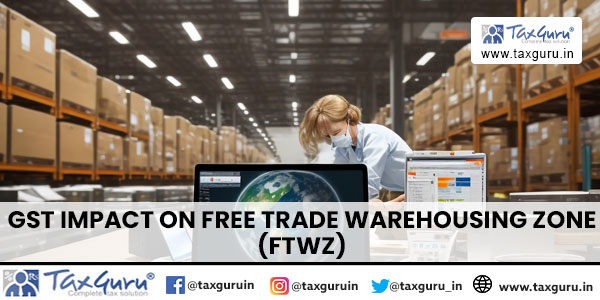Background of FTWZ:
The US was the first country to set up Free trade zones by framing the Foreign-Trade Zones Act 1934. The Foreign-Trade Zones Act was created to “expedite and encourage foreign commerce” in the United States. In India, FTWZ is considered as a special category of Special Economic Zone wherein the activities of trading, warehousing, labeling, packing, or re-packing without any processing are permitted.
Arshiya International Ltd, a leading supply chain and logistics infrastructure solutions company, has launched India’s first Free Trade and Warehousing Zone (FTWZ) in Panvel, Mumbai
Page Contents
Registration requirements for FTWZ under GST
1. As per Section 22 of the CGST Act, every supplier shall be liable to be registered under this Act from where he makes a taxable supply of goods or services or both, if his aggregate turnover in a financial year exceeds twenty lakh rupees.
2. As per the 2nd proviso to Section 25, provided further that a person having a unit, as defined in the Special Economic Zones Act, 2005 (28 of 2005), in a Special Economic Zone or being a Special Economic Zone developer shall have to apply for a separate registration, as distinct from his place of business located outside the Special Economic Zone in the same State or Union territory.
3. A “Unit” has been defined under the SEZ Act,2005, to mean
“Unit” means a Unit set up by an entrepreneur in a Special Economic Zone and includes an existing Unit, an Offshore Banking Unit, and a Unit in an International Financial Services Centre, whether established before or established after commencement of this Act.
4. Hence only those Companies which has registered as a “Unit” in FTWZ are required to obtain separate registration in the GST. On the contrary, where the Company has not registered the premises in FTWZ as a Unit and merely obtained the place for warehousing then the above said proviso would not be applicable and hence separate registration is not required.

5. However, as per Section 2(85) of the CGST Act, “place of business” includes a godown where a taxable person stores his goods, supplies or receives goods or services or both. Hence considering the above Section, where the Company has taken a warehouse for rent in the FTWZ, it is suggested to add the said place as the additional place of business.
Import of Goods by FTWZ
1. As per Section 26 of the SEZ Act,2005, any goods imported in to a Unit in SEZ for authorized operations, would be exempt from payment of any duty of customs.
Supply of goods to or from FTWZ to DTA
1. As FTWZ is a form of SEZ, any supply to or from the FTWZ will enjoy the same special status in the GST law as that of SEZ i.e. supply of goods from DTA to FTWZ will be considered as zero-rated supply as per Section 16 of the IGST Act,2017.
2. Supply of goods from FTWZ to DTA will be considered as import of goods in the hands of the DTA and accordingly, Customs duty along with the IGST will be discharged.
Supply from One FTWZ to another FTWZ
1. In the Schedule III of CGST Act,2017, the following has been inserted retrospectively w.e.f. 01/07/2017, as follows:
8(a)Supply of warehoused goods to any person before clearance for home consumption;
2. Explanation 2 of Schedule III of the CGST Act, states that, for the purposes of paragraph 8, the expression “warehoused goods” shall have the same meaning as assigned to it in the Customs Act, 1962.
3. As per section 2(43) of the Customs Act 1962, “Warehouse” means a public warehouse licensed under section 57 or a private warehouse licensed under section 58 or a special warehouse licensed under section 58A.
4. As per section 2(44) of the Customs Act, 1962 “warehoused goods” means goods deposited in a warehouse.
5. In the 25th GST Council meeting, the objective of the proposed amendment was discussed, and the intention was to alleviate the difficulty of double taxation. They explained that sales within a Customs bonded warehouse attracted IGST and when goods were cleared from the Customs bonded warehouse, they were again charged to IGST.
6. In order to alleviate this problem of double taxation, it was proposed to amend the valuation provisions of the imported goods for the purposes of payment of integrated tax by amending the Customs Tariff Act. The amendment would result in integrated tax being levied on the enhanced sale value or the last sale value in case of multiple sales or value determined under Section 3(8) of the Customs Tariff Act, whichever was higher.
7. Concomitantly, it was proposed to exempt/declare the sale of warehoused goods within the Customs bonded warehouse as ‘no supply’ under Schedule Ill of the CGST Act, 2017 in order to ensure that no integrated tax was payable in case goods were sold by the importer while these were kept in the Customs bonded warehouse.
8. However, when fixing the agenda, the GST council has not envisaged the transactions between FTWZs. Hence there revolves confusion about whether FTWZ can be considered as a bonded warehouse for the purpose of Schedule III of the CGST Act,2017.
9. Going by the plain reading of the law, it appears that transactions between the FTWZs are not covered under Schedule III Para 8(a) but transactions with respect to Customs Bonded Warehouse are only covered under Schedule III Para 8(a).
10. Further, the TN Advance ruling authority in the case of HAWORTH INDIA PVT. LTD.(2023) 11 Centax 309 (A.A.R. – GST – T.N.) [20-06-2023]), have taken a similar view, wherein they have held that transactions between FTWZ will not be covered under Para 8(a) of Schedule III to the CGST Act,2017. However, the Appellate authority of advance ruling ((2024) 17 Centax 64 (App. A.A.R. – GST – T.N.) [20-12-2023]), has set aside the order of the advance ruling authority and has remanded the matter for reconsideration.
11. Though we can argue that as per the plain reading of law, FTWZ are not bonded warehouses, however for all practical purposes they are considered as a bonded warehouse, which can also be established by way of documentation as in both cases only in-bond bill of entry are filed.
12. Further, as per Section 2(zd) of the SEZ Act,2005, all other words and expressions used and not defined in this Act but defined in the Customs Act, 1962 shall have the meanings respectively assigned to them in those Acts.
13. As the warehoused goods are not defined under the SEZ Act, it can be interpreted that the definition of the warehoused goods as per Customs can be considered and hence it would squarely fall under entry 8(a) of Schedule III to the CGST Act,2017. A similar view was also held by TN Advance ruling authority in the case of M/s SUNWODA ELECTRONIC INDIA PVT. LTD (2024) 19 Centax 153 (A.A.R. – GST – T.N.) [30-04-2024].
14. Further looking at the intention of the GST council meeting it is also very clear that they would want to alleviate the problem of double taxation in case of transfers between the warehouses. Taking the position that FTWZ would not be considered as bonded warehouse as per Schedule III would defeat the intention of the GST council. Hence, I am of the view that transactions between FTWZs would be squarely covered under entry 8(a) of Schedule III of the CGST Act,2017.
Whether ITC needs to be reversed in such cases
15. By way of an Amendment in the Finance Act, 2023 with effect from 1.10.2023, Section 17 of the CGST Act,2017, has been amended to include the value of such activities or transactions as may be prescribed in respect of clause (a) of paragraph 8 of the Schedule III within the meaning of the value of exempt supply.
16. In the Notification No. 38/2023, CT dated 04/08/2023, Explanation to the Rule 43 has been amended to include only supply from Duty Free shops will be considered as exempt supply as per Section 17(3).
17. Therefore, even though the transactions between the FTWZs are covered under S. No. 8(a) of Schedule III, it shall not be considered as Exempt Supplies for the purpose of Section 17(2) and (3) and accordingly the reversal under Rule 42/43 would not be applicable.
Conclusion:
FTWZ is an evolving concept that plays a crucial role in boosting global trade efficiency, lowering costs, and attracting foreign investment. Despite their significant benefits, challenges related to regulatory compliance, infrastructure, and competition must be overcome to fully harness their potential. Given the significant potential for industries operating in FTWZs, it is crucial that the government issues a clarificatory circular addressing the various GST-related issues faced by these industries.
*****
The author can be reached at pradeep@hnaindia.com. Feedback and suggestions are welcome.





